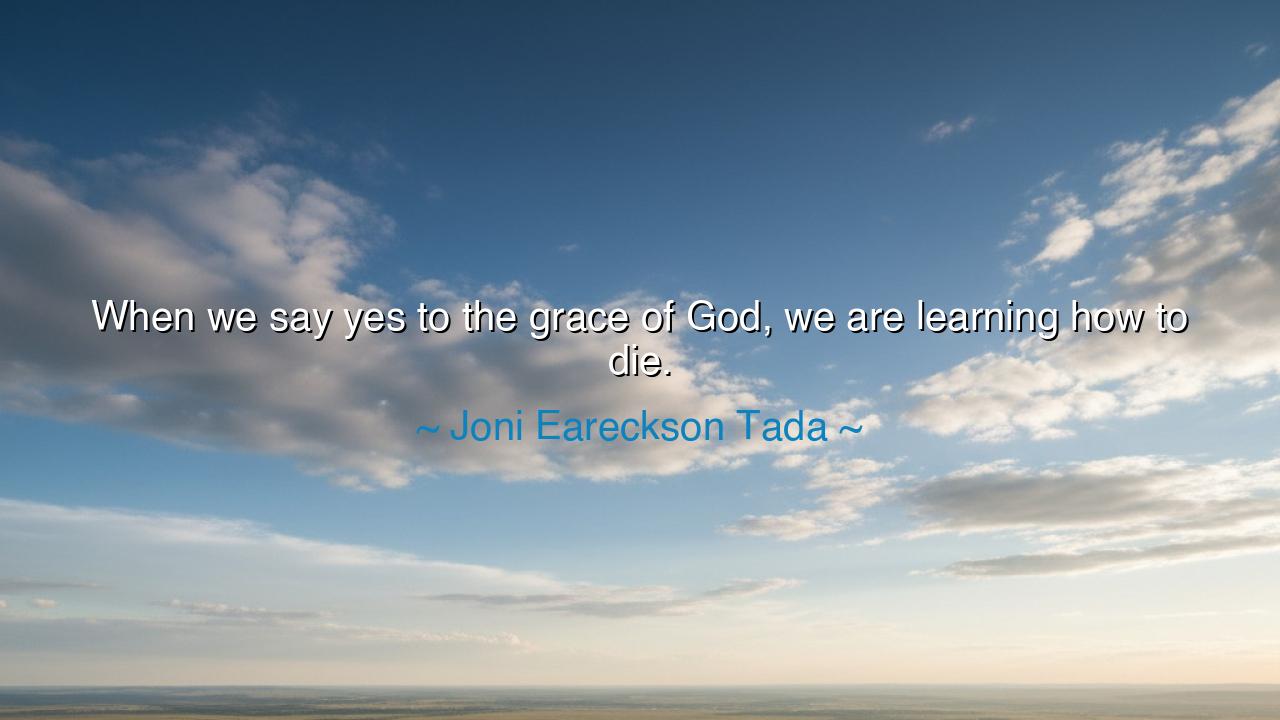
When we say yes to the grace of God, we are learning how to die.






“When we say yes to the grace of God, we are learning how to die,” said Joni Eareckson Tada, a woman whose life became both wound and testimony — a living scripture written in suffering and faith. Paralyzed as a young girl after a diving accident, she found herself face to face with despair, stripped of the strength and independence she once knew. Yet from her chair of stillness, she spoke words of fire and humility, unveiling a truth the ancients themselves would have understood: that to accept the grace of God is not merely to live, but to learn how to die — to surrender pride, control, and self to something infinitely greater.
Her words carry the quiet thunder of spiritual awakening. To say yes to the grace of God is to release one’s grip on the illusion of mastery — to yield, not in weakness, but in trust. We are born clinging to ourselves, fearing the loss of all we have built, yet the divine path calls us toward release. Death, in this sense, is not merely the end of the body, but the death of self-will, the relinquishing of ego that separates the human heart from peace. In learning to die, we learn to live as souls, not as shadows of pride and desire. Thus, Joni’s wisdom is not morbid — it is liberating. She does not speak of dying in sorrow, but of the freedom found in surrender.
The ancients often spoke of this same mystery. The philosopher Socrates, before drinking the hemlock, told his students that philosophy itself was “a preparation for death.” He meant that the pursuit of truth requires detachment from the fleeting and devotion to the eternal. In faith, Joni Eareckson Tada echoes that same teaching, now illuminated by divine light: when we embrace grace, we practice dying — dying to bitterness, to fear, to the endless struggle for control. Every act of forgiveness, every moment of patience, every prayer whispered in surrender is a small death of the self — and in each death, a resurrection of the spirit begins.
To learn how to die, therefore, is the soul’s greatest education. It teaches us that life’s purpose is not to preserve the self, but to purify it. When Joni lay in her hospital bed, she cried out to God in anger and hopelessness. Yet over time, her tears became prayers, her rebellion became revelation. She discovered that God’s grace is not the removal of suffering, but the transformation of it. She wrote, “The weaker we feel, the harder we lean on God — and the harder we lean, the stronger we grow.” That is the paradox of grace: through weakness, we are made whole; through death, we find life.
History, too, bears witness to this truth. Think of St. Francis of Assisi, who once renounced his wealth and honor to walk barefoot in poverty. The world thought him mad, but he had simply begun to learn how to die — to let go of all that was false and transient. In his surrender, he found a joy that no crown could bestow. So it is with every saint, every seeker, every heart that dares to yield: in the death of the old self, something radiant and eternal is born. Grace is the hand that leads us through that dying — gentle, steady, unwavering.
And what is this grace? It is the unearned love that meets us when we can no longer save ourselves. It is the whisper that says, “Be still; you are mine.” It teaches the soul to rest in what it cannot comprehend. To say yes to this grace is to walk willingly into mystery — to trust that every loss, every trial, every surrender is not destruction, but renewal. The soul that has learned this truth is no longer afraid of dying, for it has died many times already — to anger, to vanity, to fear — and found in each death a deeper peace.
So let this truth be passed down to all who seek understanding: the art of dying is the art of living rightly. Each day, practice letting go — of resentment, of control, of pride. Welcome humility, patience, and compassion, for these are the lessons of divine grace. When the heart learns to say “yes” to what is hard, it learns to love what is real. And in that love, the fear of death dissolves, for the soul knows it has already found eternity.
Thus, remember the wisdom of Joni Eareckson Tada: to say yes to the grace of God is to begin the greatest transformation of all. It is to die to the world and awaken to heaven — not in some distant afterlife, but here, now, in the quiet courage of surrender. For in learning how to die, we finally learn how to live — not as fragile bodies clinging to survival, but as eternal spirits resting in the embrace of divine love.






AAdministratorAdministrator
Welcome, honored guests. Please leave a comment, we will respond soon